France summoned its ambassadors to the United States and Australia for consultation on Friday, in an unprecedented move towards its historical allies, following Canberra's cancellation of a massive contract with Paris to purchase submarines and the signing of a new one with Washington for the same purpose. French Foreign Minister Jean-Yves Le Drian stated in a press release, "At the request of the President of the Republic, I have decided to immediately summon our ambassadors to Paris for consultation." He added, “This exceptional decision is justified by the extraordinary seriousness of what Australia and the United States announced on September 15.”
U.S. National Security Council spokesperson Emily Horne said, "We have been in close contact with our French partners regarding their decision to summon the ambassador to Paris for consultation. We understand their position and will continue to seek to resolve our differences in the coming days, as we have done at other times during our long-standing alliance." A White House official, speaking on condition of anonymity, also stated, "We have been in close contact with our French partners regarding their decision to summon the ambassador to Paris for consultation. We regret that they have taken this step, but we will continue to communicate in the coming days to resolve our differences, as we have done in other issues during our long-standing alliance.” The official added, “France is our oldest ally and one of our strongest partners, and we share with them a long history and democratic values and a commitment to working together to address international challenges.” He continued, “We also share the interest in ensuring that the Indo-Pacific region remains free and open. We will continue our close cooperation with NATO, the European Union, and other partners in this common endeavor.”
U.S. President Joe Biden announced on Wednesday a new defense alliance between Australia, the United States, and the United Kingdom, expanding the scope of U.S. nuclear-powered submarine technology to include Australia, along with technologies related to cybersecurity, artificial intelligence, and undersea maritime capabilities. Le Drian considered that the abandonment of the French submarine project and the announcement of a new partnership "represent unacceptable behavior between allies and partners, and their consequences affect our alliances and partnerships and the importance of the Indo-Pacific region for Europe.”
In 2016, France signed a contract worth 90 billion Australian dollars (56 billion euros) to supply 12 diesel-powered submarines to Australia, described as the "contract of the century" due to its size and strategic scope. The summoning of Paris’ ambassadors in the United States and Australia, allies of France, is unprecedented. France accused Australia on Thursday of stabbing it in the back and Washington of following the approach of former President Donald Trump regarding the submarine deal. France expressed on Friday its inability to trust Australia in ongoing discussions about reaching a trade agreement with the European Union. French authorities also canceled a ceremony scheduled for Friday in Washington, according to an official who requested anonymity.
This ceremony was meant to commemorate the anniversary of a crucial naval battle during the American Revolution, in which France played a significant role.
**Understanding from Australia**
Australia's Foreign Minister expressed her country’s understanding of France’s “disappointment” following its decision to abandon the submarine purchase, affirming the desire to continue working with Paris. Marise Payne, speaking from Washington, stated, "I completely understand the disappointment. There is no doubt that these are very difficult issues to address." She added during her remarks at the American Enterprise Institute, "But we will continue to work constructively and closely with our colleagues in France." Paris, which described the Australian decision as a "stab in the back," seemed to indicate that this step could affect trade talks in a broader sense.
French Minister of State for European Affairs Clément Beaune stated in an interview with France 24, "We are negotiating trade issues with Australia. I do not know how we will be able to trust our Australian partners." The next round of talks covering areas including trade, services, investment, and intellectual property rights, is scheduled for this fall.




